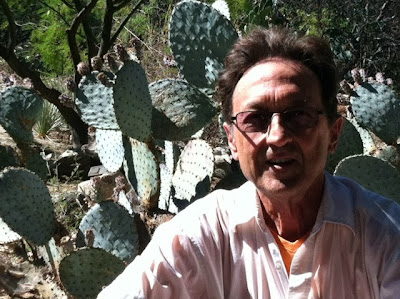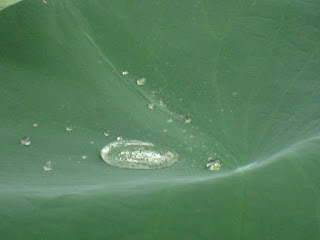Ed Rosenthal in Descanso Gardens, CA, Photo by Maja Trochimczyk
The Desert Hat is a volume of poetry inspired by a six-and-a-half-day ordeal of Ed Rosenthal, a Poet-Broker, who survived alone after being lost in the Mojave Desert in September 2010. An experienced hiker, he unexpectedly veered far away from his usual route and could not find his way back. He found refuge in Salvation Canyon, was several times missed by search-and-rescue aircraft and helicopters, and finally, miraculously was found by San Bernardino County Sheriff's Deputies.
The wry, surreal, and reflective poems in
The Desert Hat: Survival Poems describe the spiritual trajectory of a survivor living through a close encounter with death, starting from alienation in a corporate urban environment and ending with the post-trauma reflections about life and natural environment.
The book consists of 36 poems organized in four sections, reflecting the distinct stages in the spiritual and personal journey, from getting off track, through searching for a way back, hallucination in a hostile desert environment, finding shelter in the shade of Salvation Canyon, being rescued, and experiencing the world after the return from the brink of death. The title alludes to a canvas hat that Rosenthal used as a notebook and helped the lost poet control his thoughts, capture emotions, and write down his last will and a farewell to his wife and daughter.
The volume is illustrated with photos of the various sections of the famous hat that helped the poet survive his ordeal. He wrote messages to his family, including instructions for the wake and farewells. The photos were taken by Maja Trochimczyk in September 2013 in Descanso Gardens, along with a portrait of the poet-broker, who was wearing his lucky white shirt - it did not even get torn during the six and a half days in the desert.
Here's one of the title poems, The Hat I:
The Hat I
I
got to the place out of the sun after a three day search
the
first day looking for an exit, the second hiding
under
a tree, the third morning of survival
A
cold moon follows the blistering vision of day
I
went downhill for succor, for a friend to lean against
from
sun and night wind
In
short-sleeve shirt and shorts I had to hide
under
a clamshell rock with a split orange face
till
the sun slapped me to wake again
I
ran in here to the blessed salvation canyon of shadows
Seeing
I would outlive that day’s sun and maybe
only
another, I turned my hat to a mirror,
my
pen to my blood’s red artery
“My
dear wife and daughter, I lost the trail of celebration
of
deals. I may never see you, read my wish and will.”
Out
in a desert canyon my love poured onto nylon flaps
inside
seams and creases as the mirror turned into
a
bouquet of pomegranates and apricots
for
a circle of friends gathered by the barbecue of stewed tomatoes, candied rice
with roasted meats and broiled fish at my wake of smoking and carousing,
with
the clink of vodka glasses,
per
my will, written on my desert hat
to
be executed by my beloved
for
my only child.
__________________________________________________
ABOUT THE DESERT HAT
In "The Desert Hat," Los Angeles poet/real estate broker Ed Rosenthal presents the mythopoetic journey through his real-life experience of being lost for 6 days in remote canyons of the Mojave Desert's Joshua Tree National Park in September, 2010. "The Desert Hat" delves deeply into the wildest and unpredictable heart of the Mojave into a storied landscape that Rosenthal renders as both recognizable to the reader and also deeply specific to his solitary and unanticipated experience, and in these poems, creates an empathetic and spiritually-affirming desert landscape that resonates within all of our desert hearts.
~ Ruth Nolan
Professor of English @ College of the Desert
California desert poet, writer, editor,conservationist & scholar
Ed Rosenthal’s The Desert Hat not only recounts an incredibly vivid story of survival, but maps out the dangerous journeys of the heart and the imagination in that hallucinatory place between mind and body, between nature and man, between the past and the future. Like poet James Wright, Rosenthal ”goes/ Back to the broken ground” of the self and finds a stranger there trapped in the cosmology of an endless, unpitying desert. As the stark “sun burns holes/ into the sky” the psyche’s true-north compass finds salvation’s shade. Rosenthal climbed out of “the busted monster’s mouth” with a beautiful, moving
book.
~ Elena Karina Byrne
Executive Director of AVK Arts
author of The Flammable Bird, Masque and Squander
The “poet-broker” Ed Rosenthal was inspired by surviving alone in the Mojave Desert for six and a half days. Rosenthal’s poetry does not recount his experience in detail; it is not replete with maps, photographs, and a day-by-day account of his adventures. Instead, we gain an insight into what it means to be truly lost and found, to survive the strangest of desert nights and return to the heart of the city… with a newly found wisdom and zest for life.
~ Maja Trochimczyk, Ph.D.
President, Moonrise Press
_________________________________________________
The Desert Hat
Paperback print edition
ISBN 978-0-9819693-7-4
74 pages, $15.00.
E-Book, $10.00
ISBN 978-0-9819693-9-8
Publisher's Spotlight on Lulu.com:
























